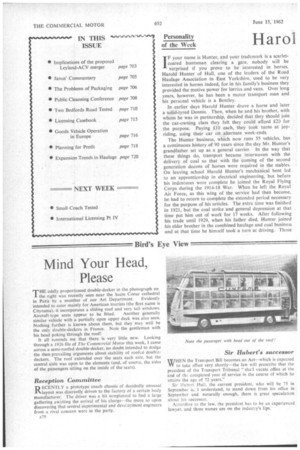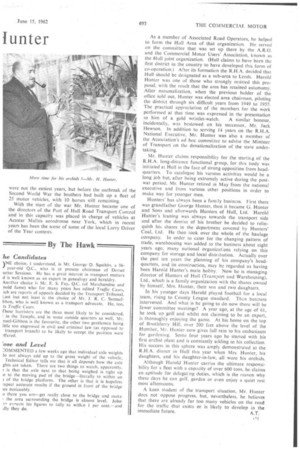Harol iunter
Page 32

Page 33

If you've noticed an error in this article please click here to report it so we can fix it.
IF your name is Hunter, and your trademark is a scarletcoated huntsman clearing a gate, nobody will be surprised if you prove to be interested in horses. Harold Hunter of Hull, one of the leaders of the Road Haulage Association in East Yorkshire, used to be very interested in horses indeed, for in his family's business they provided the motive power for lorries and vans. Over long years, however, he has been a motor transport man and his personal vehicle is a Bentley.
In earlier days Harold Hunter drove a horse and later a solid-tyred Dennis. Then, when he and his brother, with whom he was in partnership, decided that they should join the car-owning class they felt they could afford 120 for the purpose. Paying £10 each, they took turns at joyriding, using their car on alternate week-ends.
The Hunter business, which now runs 55 vehicles, has a continuous history of 90 years since the day Mr. Hunter's grandfather set up as a general carrier. In the way that these things do, transport became interwoven with the delivery of coal so that with the coming of the second generation dozens of horses were required in the stables. On leaving school Harold Hunter's mechanical bent led to an apprenticeship in electrical engineering, but before his indentures were complete he joined the Royal Flying Corps during the 1914-18 War. When he left the Royal Air Force, as this wing of the service had then become, he had to return to complete the extended period necessary for the purpose of his articles. The extra time was finished in 1921, but the coal strike and general depression at that time put him out of work for 17 weeks. After following his trade until 1929, when his father died, Hunter joined his elder brother in the combined haulage and coal business and at that time he himself took a turn at driving.. Those were not the easiest years, but before the outbreak of the Second World War the brothers had built up a fleet of 25 motor vehicles, with 10 horses still remaining.
With the start of the war Mr. Hunter became one of the directors of the Port of Hull Road Transport Control and in this capacity was placed in charge of vehicles at Acaster MaIbis aerodrome near York, which in recent years has been the scene of some of the local Lorry Driver of the Year contests.
. As a member of Associated Road Operators, he helped to form the Hull Area of that organization. He. served on the committee that was set up there by the A.R.O. and the Commercial Motor Users' Association, known as the Hull joint organization. (Hull claims to have been the first district in the country to have developed this form of co-operation.) After its formation the R.H.A. decided that Hull should be designated as a sub-area to Leeds. Harold Hunter was one of those who strongly resisted this proposal, with the result that the area has retained autonomy. After nationalization, when the previous holder of the office sold out, Hunter was elected area chairman, piloting the district through six difficult years from 1949 to 1955. The practical appreciation of the members for the work performed at that time was expressed in the presentation to him of a gold wristlet-watch. A similar honour, incidentally, was bestowed on his successor, Mr. Jack Hewson. In addition to serving 14 years on the R.H.A. National Executive, Mr. Hunter was also a member of the Association's ad hoc committee te advise the Minister of Transport on the denationalization of the state undertaking.
Mr. Hunter claims responsibility for the starting of the R.H.A. long-distance functional group, for this body was initiated at Hull in the face of strong opposition from headquarters. To catalogue his various activities would be a long job but, after being extremely active during the postwar period, Mr. Hunter retired in May from the national executive and from various other positions in order to make way for younger men.
Hunters has always been a family business. First there was grandfather George Hunter, then it became G. Hunter and Sons and afterwards Hunters of Hull, Ltd. Harold Hunter's leaning was always towards the transport side and after the demise of his brother he decided to relinquish his shares in the department covered by Hunters' Coal, Ltd. He then took over the whole of the haulage company. In order to cater for the changing pattern of trade, warehousing was added to the business about eight years ago, many national •organizat:ons relying on this company for storage and local distribution. Actually over the past ten years the planning of his company's headquarters, and its construction, may be regarded as having been Harold Hunter's main hobby. Now he is managing director of Hunters of Hull (Transport and Warehousing), Ltd., which is a family organization with the shares owned by himself, Mrs. Hunter, their son and two daughters.
In his younger days Harold played football for a local team, rising to County League standard. Then business intervened, And what is he going'to do now there will be fewer committee meetings? A year ago, at the age of 61, he took up golf and whilst not claiming to be an expert, is thoroughly enjoying the game. At his home on the top of Boothferry Hill, over 200 feet above the level of the Humber, Mr. Hunter now gives full rein to his enthusiasm for gardening. Some four years ago he started with his first orchid plant and is constantly adding to his collection. His success in this sphere was amply demonstrated at the R.H.A. dinner in Hull this year when Mrs Hunter, his daughters, and his daughter-in-law, all wore his orchids.
Although Harold Hunter carries the ultimate responsibility for a fleet with a capacity of over 600 tons, he claims an aptitude for delegating duties, which is the reason why these days he can golf, garden or even enjoy a quiet rest most afternoons.
A keen student of the transport situation, Mr. Hunter does not oppose progress, but, nevertheless, he believes that there are already far too many vehicles on the road for the traffic that exists or is likely to develop in the immediate future. A.T.




















































































































